高考英语一轮词类语法复习之动词分类整理及分析课件
文档属性
| 名称 | 高考英语一轮词类语法复习之动词分类整理及分析课件 |

|
|
| 格式 | rar | ||
| 文件大小 | 27.1KB | ||
| 资源类型 | 教案 | ||
| 版本资源 | 通用版 | ||
| 科目 | 英语 | ||
| 更新时间 | 2010-12-19 18:09:00 | ||
图片预览

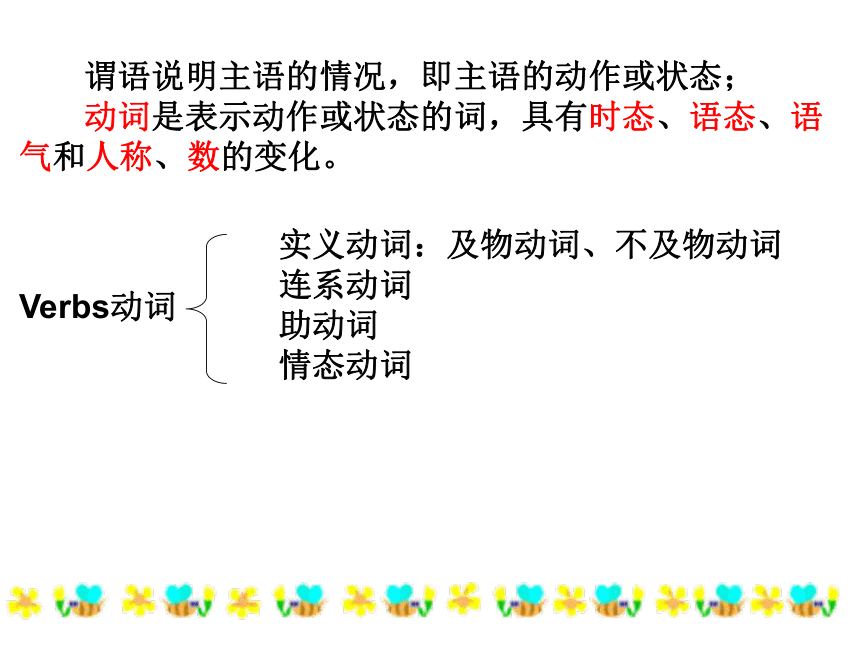
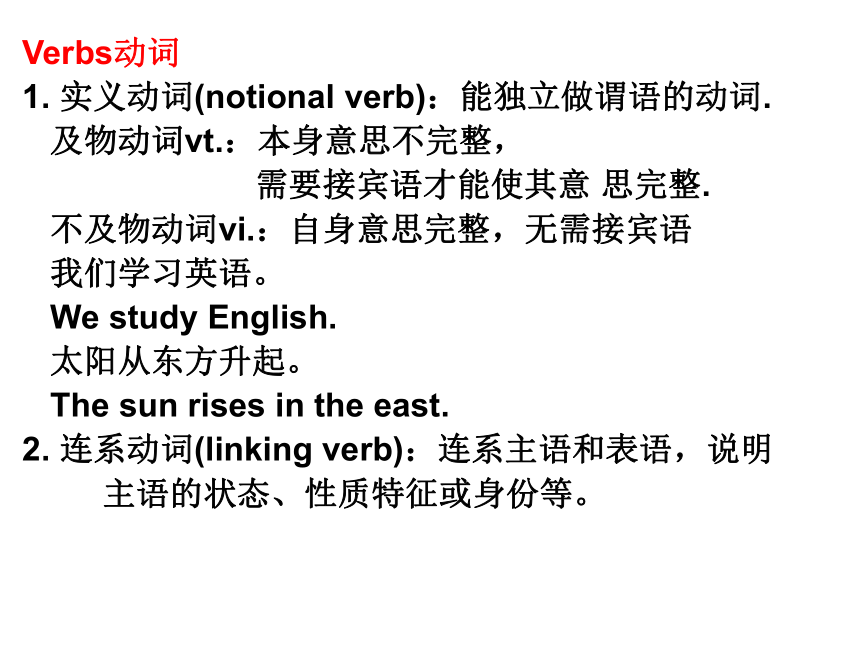
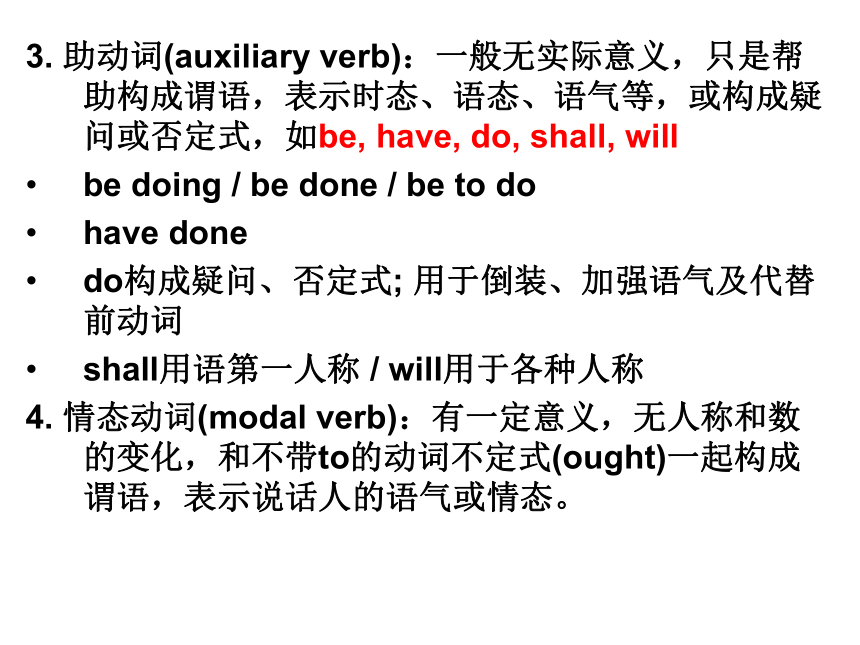
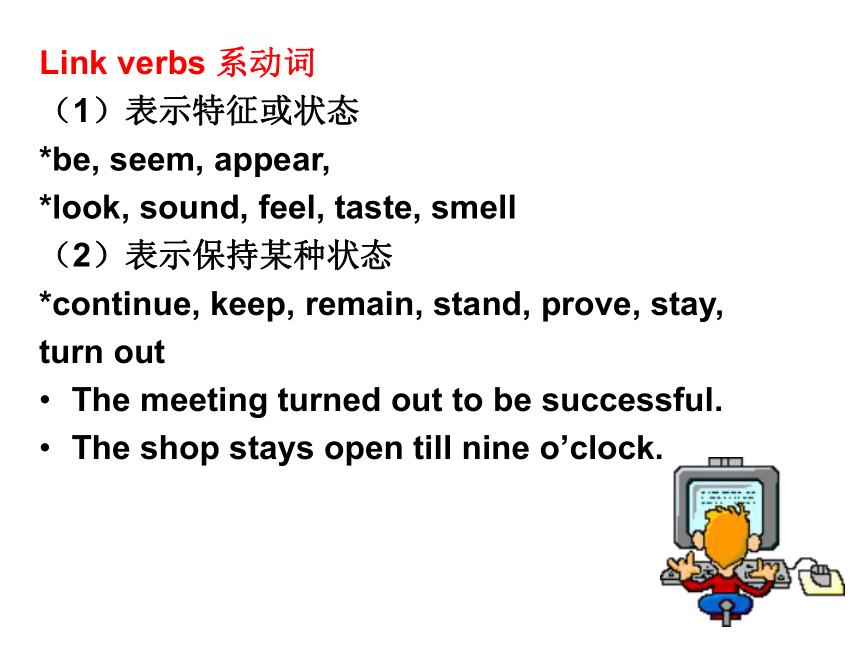
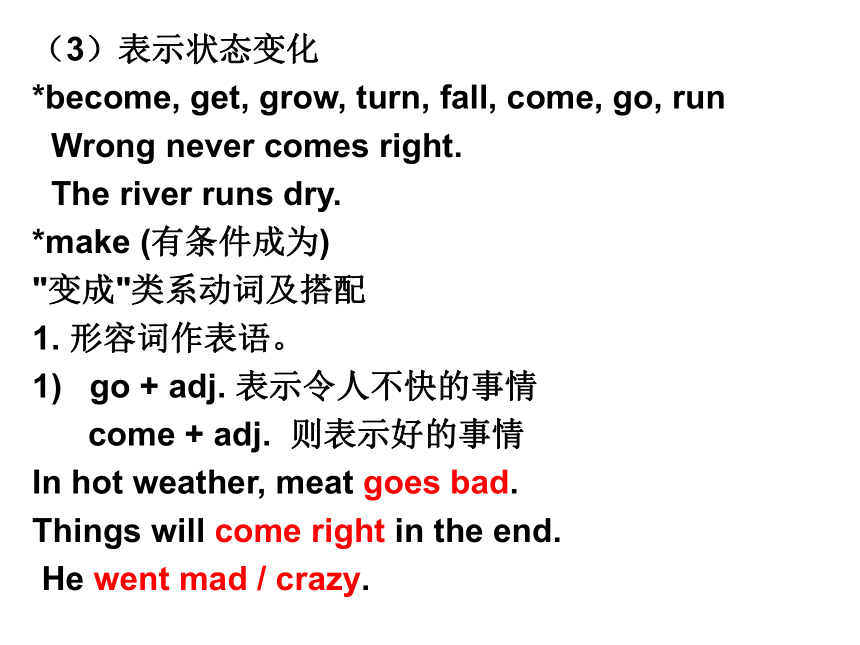
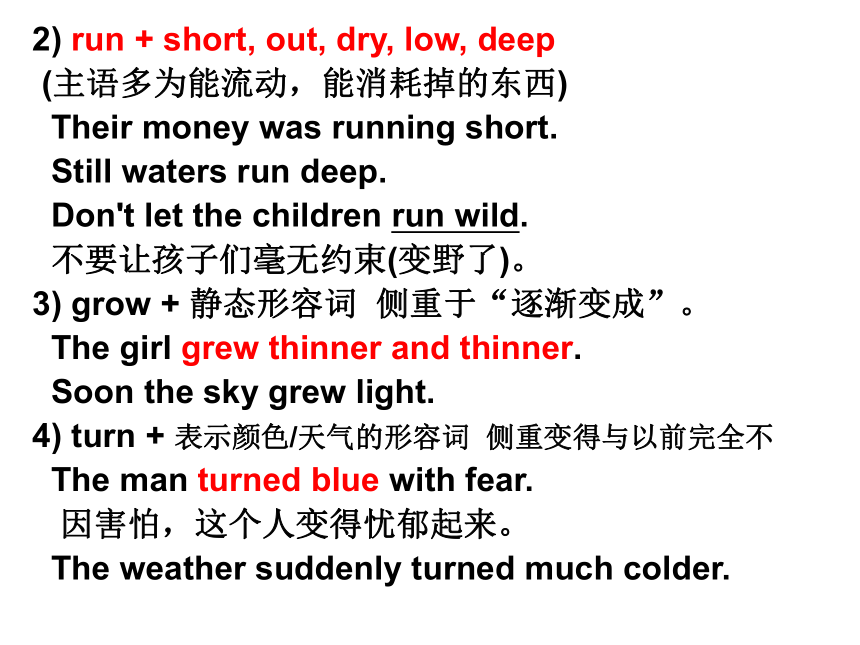
文档简介
课件18张PPT。动词分类与形式 谓语说明主语的情况,即主语的动作或状态;
动词是表示动作或状态的词,具有时态、语态、语气和人称、数的变化。 实义动词:及物动词、不及物动词
连系动词
助动词
情态动词Verbs动词Verbs动词
1. 实义动词(notional verb):能独立做谓语的动词.
及物动词vt.:本身意思不完整,
需要接宾语才能使其意 思完整.
不及物动词vi.:自身意思完整,无需接宾语
我们学习英语。
We study English.
太阳从东方升起。
The sun rises in the east.
2. 连系动词(linking verb):连系主语和表语,说明
主语的状态、性质特征或身份等。3. 助动词(auxiliary verb):一般无实际意义,只是帮助构成谓语,表示时态、语态、语气等,或构成疑问或否定式,如be, have, do, shall, will
be doing / be done / be to do
have done
do构成疑问、否定式; 用于倒装、加强语气及代替前动词
shall用语第一人称 / will用于各种人称
4. 情态动词(modal verb):有一定意义,无人称和数的变化,和不带to的动词不定式(ought)一起构成谓语,表示说话人的语气或情态。Link verbs 系动词
(1)表示特征或状态
*be, seem, appear,
*look, sound, feel, taste, smell
(2)表示保持某种状态
*continue, keep, remain, stand, prove, stay,
turn out
The meeting turned out to be successful.
The shop stays open till nine o’clock.(3)表示状态变化
*become, get, grow, turn, fall, come, go, run
Wrong never comes right.
The river runs dry.
*make (有条件成为)
"变成"类系动词及搭配
1. 形容词作表语。
go + adj. 表示令人不快的事情
come + adj. 则表示好的事情
In hot weather, meat goes bad.
Things will come right in the end.
He went mad / crazy.2) run + short, out, dry, low, deep
(主语多为能流动,能消耗掉的东西)
Their money was running short.
Still waters run deep.
Don't let the children run wild.
不要让孩子们毫无约束(变野了)。
3) grow + 静态形容词 侧重于“逐渐变成”。
The girl grew thinner and thinner.
Soon the sky grew light.
4) turn + 表示颜色/天气的形容词 侧重变得与以前完全不
The man turned blue with fear.
因害怕,这个人变得忧郁起来。
The weather suddenly turned much colder. 5) fall + asleep, silent, ill 不能接形容词比较级。
She fell ill from cold.
(误)She fell worse . (正)She got worse.
6) get + adj . 口语,用得广泛,较多地与形容词比较级连用
become 较正式
He became (got) angry. His coat has become (got) badly torn.
The days are getting longer and longer.
注意:become 一般不用于"将来成为"的意思。
(误)I hope you will become well.
(正)I hope you will get well. 2. become, turn, get, go, fall能用名词作表语
His dream has become (got) a reality. He has turned scientist. He has gone socialist. He fell (a) victim to cancer. (他患了癌症。)
注意:go , turn 后面的名词通常不带冠词。
3. come , grow , get + to do 表示变化过程,
I've really come to love this place. 表示"最终变得" Mary's growing to be more and more like her mother. 表示"渐渐变得" You'll soon get to like it. 表示"由不……变得"
注意:不能用于带有一段时间的完成时态 (误)They have got to know each other for years. (正)They have known each other for years. 4.接介词短语,固定搭配 They went (grow) out of fashion. (它们变得不时髦了。) They ran out of money. The problem will come under discussion. They fell behind the others. What has become of the girl? It's getting near tea-time. Modal verbs情态动词
can/could – be able to
may/might
must – must not;have to
need
should/ought to
dare
shall
will/wouldcan, could
I can speak English.
Could you tell me the way?
--Could I use your pen?
-- Yes, you can.
It can’t be Mary who did it.
Can it be Mary who did it?
may, might
May I use your bike?
Tom might have some fever.
She may come and see you tonight, but she isn’t sure.must, must not
We must serve the people heart and soul.
You must be tired after the long walk.
She must have been there before.
have to
The paper has to be typed before it is handed in.
It’s nine o’clock. We have to be in a hurry.
need, needn’t
You needn’t do it again.
Need I say it once again?
--Need I come again?
--Yes, you must. / No, you needn’t. / No, you don’t have to. should
As a teacher, you should be strict with your students.
Such a thing shouldn’t be allowed to happen again.
It’s requested that you should be present at the meeting.
ought to
You ought to listen to your parents.
They ought to be there in time.dare, dared
I dare not go there alone.
How dare you say I’m unfair?
Not one of them dared do such thing.
shall
You shall have the book as soon as I get it.
Don’t worry. You shall get the answer this afternoon.
Shall I open the door?
Where shall he wait for you?will
I will tell you about it.
Will you go there with me?
Won’t you take off your coat?
Man will die out of air.
would
We promised we would do everything for you.
Would you have some tea?
She would go to bed at 10 in the evening.表示对现在或过去情况的猜测must, can, could, may, might均可表示推测,且语气逐次减弱。
must用于有把握的肯定推测
can一般用于疑问句或有把握的否定推测
may, might用于没有把握的肯定或否定推测
对现在或未来情况进行猜测:+do
对此刻正在发生的事情进行猜测:+be doing
对过去情况进行猜测:+have done
表示轻微的责备或后悔ought to / should have done
本应做却没有做
oughtn’t to / shouldn’t have done
本不该做但却做了
needn’t have done
本不必做却做了
could / might have done
本能做而没有做
动词是表示动作或状态的词,具有时态、语态、语气和人称、数的变化。 实义动词:及物动词、不及物动词
连系动词
助动词
情态动词Verbs动词Verbs动词
1. 实义动词(notional verb):能独立做谓语的动词.
及物动词vt.:本身意思不完整,
需要接宾语才能使其意 思完整.
不及物动词vi.:自身意思完整,无需接宾语
我们学习英语。
We study English.
太阳从东方升起。
The sun rises in the east.
2. 连系动词(linking verb):连系主语和表语,说明
主语的状态、性质特征或身份等。3. 助动词(auxiliary verb):一般无实际意义,只是帮助构成谓语,表示时态、语态、语气等,或构成疑问或否定式,如be, have, do, shall, will
be doing / be done / be to do
have done
do构成疑问、否定式; 用于倒装、加强语气及代替前动词
shall用语第一人称 / will用于各种人称
4. 情态动词(modal verb):有一定意义,无人称和数的变化,和不带to的动词不定式(ought)一起构成谓语,表示说话人的语气或情态。Link verbs 系动词
(1)表示特征或状态
*be, seem, appear,
*look, sound, feel, taste, smell
(2)表示保持某种状态
*continue, keep, remain, stand, prove, stay,
turn out
The meeting turned out to be successful.
The shop stays open till nine o’clock.(3)表示状态变化
*become, get, grow, turn, fall, come, go, run
Wrong never comes right.
The river runs dry.
*make (有条件成为)
"变成"类系动词及搭配
1. 形容词作表语。
go + adj. 表示令人不快的事情
come + adj. 则表示好的事情
In hot weather, meat goes bad.
Things will come right in the end.
He went mad / crazy.2) run + short, out, dry, low, deep
(主语多为能流动,能消耗掉的东西)
Their money was running short.
Still waters run deep.
Don't let the children run wild.
不要让孩子们毫无约束(变野了)。
3) grow + 静态形容词 侧重于“逐渐变成”。
The girl grew thinner and thinner.
Soon the sky grew light.
4) turn + 表示颜色/天气的形容词 侧重变得与以前完全不
The man turned blue with fear.
因害怕,这个人变得忧郁起来。
The weather suddenly turned much colder. 5) fall + asleep, silent, ill 不能接形容词比较级。
She fell ill from cold.
(误)She fell worse . (正)She got worse.
6) get + adj . 口语,用得广泛,较多地与形容词比较级连用
become 较正式
He became (got) angry. His coat has become (got) badly torn.
The days are getting longer and longer.
注意:become 一般不用于"将来成为"的意思。
(误)I hope you will become well.
(正)I hope you will get well. 2. become, turn, get, go, fall能用名词作表语
His dream has become (got) a reality. He has turned scientist. He has gone socialist. He fell (a) victim to cancer. (他患了癌症。)
注意:go , turn 后面的名词通常不带冠词。
3. come , grow , get + to do 表示变化过程,
I've really come to love this place. 表示"最终变得" Mary's growing to be more and more like her mother. 表示"渐渐变得" You'll soon get to like it. 表示"由不……变得"
注意:不能用于带有一段时间的完成时态 (误)They have got to know each other for years. (正)They have known each other for years. 4.接介词短语,固定搭配 They went (grow) out of fashion. (它们变得不时髦了。) They ran out of money. The problem will come under discussion. They fell behind the others. What has become of the girl? It's getting near tea-time. Modal verbs情态动词
can/could – be able to
may/might
must – must not;have to
need
should/ought to
dare
shall
will/wouldcan, could
I can speak English.
Could you tell me the way?
--Could I use your pen?
-- Yes, you can.
It can’t be Mary who did it.
Can it be Mary who did it?
may, might
May I use your bike?
Tom might have some fever.
She may come and see you tonight, but she isn’t sure.must, must not
We must serve the people heart and soul.
You must be tired after the long walk.
She must have been there before.
have to
The paper has to be typed before it is handed in.
It’s nine o’clock. We have to be in a hurry.
need, needn’t
You needn’t do it again.
Need I say it once again?
--Need I come again?
--Yes, you must. / No, you needn’t. / No, you don’t have to. should
As a teacher, you should be strict with your students.
Such a thing shouldn’t be allowed to happen again.
It’s requested that you should be present at the meeting.
ought to
You ought to listen to your parents.
They ought to be there in time.dare, dared
I dare not go there alone.
How dare you say I’m unfair?
Not one of them dared do such thing.
shall
You shall have the book as soon as I get it.
Don’t worry. You shall get the answer this afternoon.
Shall I open the door?
Where shall he wait for you?will
I will tell you about it.
Will you go there with me?
Won’t you take off your coat?
Man will die out of air.
would
We promised we would do everything for you.
Would you have some tea?
She would go to bed at 10 in the evening.表示对现在或过去情况的猜测must, can, could, may, might均可表示推测,且语气逐次减弱。
must用于有把握的肯定推测
can一般用于疑问句或有把握的否定推测
may, might用于没有把握的肯定或否定推测
对现在或未来情况进行猜测:+do
对此刻正在发生的事情进行猜测:+be doing
对过去情况进行猜测:+have done
表示轻微的责备或后悔ought to / should have done
本应做却没有做
oughtn’t to / shouldn’t have done
本不该做但却做了
needn’t have done
本不必做却做了
could / might have done
本能做而没有做
